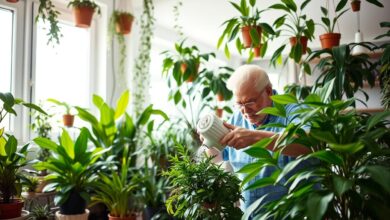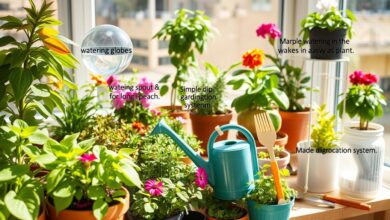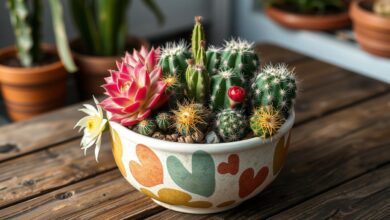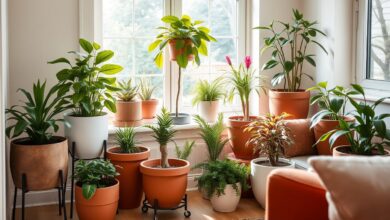Best Pet-safe Houseplants for Seniors to Grow Indoors
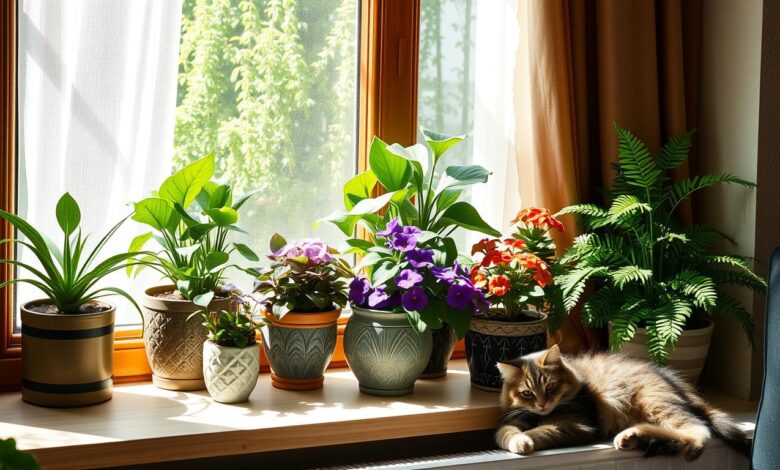
As a senior, growing an indoor garden can be a joy. However, it’s important to prioritize safety for your pets. Luckily, there are plenty of pet-safe houseplants for seniors that are both beautiful and non-toxic.
The ASPCA provides a helpful list of plants safe for dogs and cats. Great choices include the Chinese Money Plant, Money Tree, and Hoya varieties. These plants are easy to care for, add charm to your space, and keep your pets safe.
Table of Contents
Understanding the Importance of Pet-Safe Plants for Senior Living
As seniors enjoy their golden years, creating a caring home is key. Choosing pet-friendly houseplants is important. These plants make the home look good and help seniors feel better.
Benefits of Indoor Plants for Senior Well-being
Studies show nature is great for our health and happiness. Being near nature can make us feel less angry, scared, and stressed. It also makes us feel happier.
Being around plants can boost our mood. It helps us focus better and be more creative. Plus, activities like gardening can fight loneliness in seniors.
Why Choose Pet-Safe Varieties
Seniors with pets need to pick pet-friendly houseplants. Some plants, like lilies and aloe vera, can harm pets. Choosing low-maintenance plants that are safe for pets lets seniors enjoy nature without worry.
ASPCA Guidelines for Plant Safety
The ASPCA has a list of plants safe for pets. This helps seniors pick the right pet-safe houseplants. By following the ASPCA’s plant safety guidelines, seniors can have beautiful plants and keep their pets safe.
“Regular exposure to natural settings can increase serotonin levels, often referred to as the ‘feel-good’ neurotransmitter.”
Low-Maintenance Indoor Plants Perfect for Seniors
Creating a lush indoor oasis is easy with low-maintenance plants. Spider plants, Boston ferns, and African violets are great for seniors. They need little care, perfect for those with less energy or mobility.
Spider plants are tough and clean the air. They grow well in different light, making them great for seniors’ homes. Their long, flowing leaves add beauty and need watering only sometimes.
- Hardy in USDA zones 9 to 11
- Prefer well-drained, sandy loam soil with a pH between 5.0 and 7.0
- Only need to be watered every two to three weeks
Boston ferns are another good choice. They have soft, green leaves and do well in little light. These plants are safe for pets and easy to care for, making them perfect for seniors.
“Boston ferns are a great option for seniors because they don’t require extensive watering or pruning, yet they still add a beautiful, natural touch to any indoor space.”
African violets are also great for seniors. They have bright flowers and don’t take up much space. These plants do well in various light, from bright to dim. Their colorful blooms and easy care make them a joy for seniors’ gardens.
Popular Pet-safe Houseplants for Seniors
Seniors want a cozy, pet-friendly home. Choosing the right indoor plants is key. There are many safe, thriving options that also boost well-being. These plants range from easy-to-care-for flowers to air purifiers, offering endless choices.
Easy-Care Flowering Options
African Violets and Gerbera Daisies are safe, colorful picks for seniors. They need little care, doing well in bright, indirect light and moderate water. Their bright blooms add joy and color to any room.
Air-Purifying Varieties
Seniors looking to clean the air should consider spider plants. These plants are safe for pets and easy to care for. They remove toxins from the air and add natural beauty with their cascading leaves.
Space-Saving Choices
Peperomia is a great choice for seniors with limited space. These small, safe plants come in many shapes and sizes. They need little water and indirect light, making them perfect for busy seniors.
“The right pet-safe houseplants can bring joy, improve air quality, and create a serene living space for seniors.”
By choosing pet-safe, non-toxic plants, seniors can enjoy gardening’s benefits. They keep their homes safe for pets while enjoying the beauty of nature indoors.
Spider Plants: The Ultimate Senior-Friendly Choice
The spider plant is a top pick for indoor plants in senior living. It’s low-maintenance and air-purifying. Plus, it’s safe for pets, perfect for seniors with pets.
Spider plants can grow well in different light conditions. They do great in bright, indirect light or artificial light. Their long leaves and baby plants add charm to any room. They also help clean the air, making them a smart choice for homes.
- Spider plants can handle irregular watering, which is great for seniors with mobility issues.
- They can grow new plants easily, letting seniors share their green thumb with others.
- Being non-toxic plants, they’re safe for pets, giving seniors peace of mind.
“Spider plants are the ultimate low-maintenance, pet-friendly addition to any senior’s indoor garden. Their air-purifying qualities and resilience make them a must-have for creating a healthy, welcoming environment.”
Spider plants are perfect for seniors who want a rewarding indoor garden. They’re versatile, clean the air, and safe for pets.
Boston Ferns: Safe and Stylish Greenery
The Boston fern (Nephrolepis exaltata) is a great choice for pet-safe houseplants in senior living spaces. These plants are not only stylish but also safe for curious cats and dogs.
Care Requirements
Boston ferns love humid places and bright, indirect light. They need moist soil, so water them often but avoid too much water. Use distilled or filtered water to protect them from fluoride.
Placement Tips
Keep your Boston fern out of pets’ reach. Hang it in a basket or place it high up. This adds beauty and keeps pets away. A bright, indirect light spot near a window is best for it to thrive.
Health Benefits
Boston ferns are not just safe and stylish. They also clean the air well. Studies show they remove harmful air pollutants, making the air healthier and improving well-being.
“Opting for pet-friendly plants like the Boston fern is a wise choice for seniors with furry companions. These ferns not only add a touch of lush greenery to the home but also help purify the air, making them a win-win for both you and your four-legged friends.”
Adding a Boston fern to your indoor garden is a smart move. It brings beauty and air-purifying benefits while keeping your pets safe.
African Violets: Colorful and Safe Options
African violets are a great choice for pet-safe houseplants for seniors. They are safe for pets and easy to care for. This makes them perfect for any senior’s indoor garden.
These plants bloom almost all year, thriving in low light and moderate temperatures. They are great for small spaces in senior homes.
African violets are safe for pets, unlike many houseplants. This is important for senior pet owners who want a safe home environment.
They are also easy to care for. Just water them occasionally and fertilize every 4-6 weeks. Their small size fits well on windowsills or shelves in senior homes. With the right care, they bloom several times a year, adding beauty to any room.
“African violets are one of the easiest indoor flowering plants to grow, making them a wonderful choice for seniors who want to enjoy the benefits of indoor gardening without the hassle of high-maintenance plants.”
When picking an African violet, choose a pet-safe variety. Some may have harmful compounds. African violets are colorful, low-light tolerant, and easy to care for. They are a safe and stylish choice for any pet-friendly indoor garden for seniors.
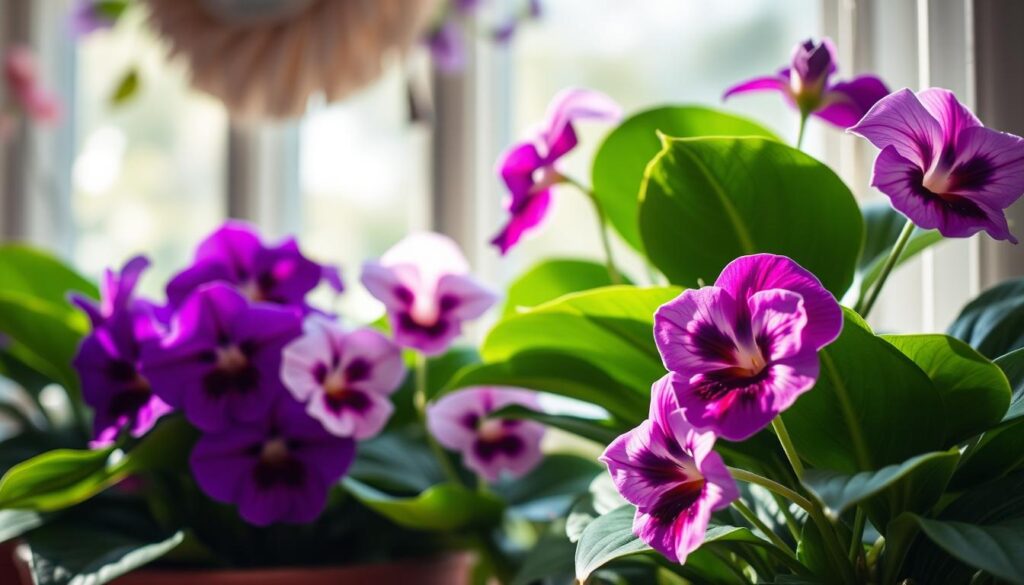
Maintaining Indoor Plants with Limited Mobility
For seniors with limited mobility, caring for indoor plants can be both rewarding and challenging. But, with the right tools and techniques, you can keep your plants thriving. This way, you can enjoy gardening without straining your body.
Watering Solutions
Self-watering pots are a big help for seniors with mobility issues. These pots have built-in water reservoirs that slowly release water to the roots. This means you don’t have to water your plants as often.
Long-handled watering tools, like extended-reach watering cans, also make watering easier. They let you water plants without bending or straining your back.
Accessible Gardening Tools
- Invest in lightweight, portable planters that can be easily moved around your home. This lets you change your garden layout as you like.
- Consider raised plant stands or wall-mounted planters. They bring your plants closer, so you don’t have to bend or stretch.
- Use adaptive gardening tools, like ergonomic hand trowels and pruners. They’re made for seniors to reduce hand and wrist strain.
By using these senior-friendly solutions, you can keep a beautiful indoor garden. It’s all about planning and using the right tools. This way, gardening becomes a fun and rewarding activity for seniors.
Best Locations for Pet-Safe Plants in Senior Homes
Choosing the right spots for your pet-friendly houseplants is key. It’s important to make senior living spaces both beautiful and safe for pets. There are great places to put your indoor garden.
Begin by placing plants on sunny windowsills. They love natural light. Use shelves and stands that pets can’t reach. For a stylish look, hang baskets with hanging plants.
Spider Plants are great for air quality. Put them in bedrooms or living rooms. They clean the air and look good too.
- Opt for well-lit windowsills to showcase your pet-friendly plants.
- Utilize shelves and plant stands positioned out of your pets’ reach.
- Hang baskets filled with cascading foliage to add depth and visual interest.
- Position air-purifying plants like Spider Plants in bedrooms and living areas.
Think about how you arrange your garden. Make sure plants are easy to water and care for. This way, you and your pets can live happily together.
Essential Care Tips for Senior Plant Parents
Caring for houseplants can be a fun and calming hobby for seniors. It’s key to have simple yet effective care routines for your plants to thrive. Here are some important tips for senior plant parents to give their plants the best care.
Watering Schedules
Getting the watering right is vital for your plants’ health. Don’t overwater, as it can cause root rot. Use a moisture meter or the “finger test” to know when to water. Snake plants, for example, need watering only every 6-8 days, making them great for seniors with mobility issues.
Light Requirements
Each plant has its own light needs. It’s important to put them in the right spot. ZZ plants can go weeks without water and do well in low light. On the other hand, cast iron plants need bright, indirect sunlight. Group your plants by their light needs to make caring for them easier.
“The key to successful indoor gardening for seniors is finding low-maintenance, easy-care greenery that can thrive with minimal effort.”
By setting up simple watering schedules and knowing what light your plants need, senior plant parents can enjoy the perks of plant care for seniors, low-maintenance houseplants, and easy-care greenery. With a bit of planning and the right plants, your indoor garden can be a source of joy and peace for many years.
Avoiding Common Plant Care Mistakes
As a senior gardener, it’s key to watch out for common mistakes that can harm your indoor plants. Overwatering and not enough light are two big ones. These mistakes can turn a lush garden into a sad one.
Overwatering is a big no-no, especially for new gardeners. It hurts plant growth and health. Check the soil moisture before watering and use drip irrigation for steady water.
Lighting is also super important. Each plant needs different light levels. Learn what your senior-friendly houseplants need. If natural light is lacking, use artificial light to help them grow well.
Choosing the right soil is crucial. It should drain well, have the right pH, and feel good to the plants. Don’t use soil with weeds or diseases, as they can harm your garden fast.
- Regularly prune and remove any wilted or damaged parts of your plants to maintain their vitality.
- Consider using natural fertilizers, such as compost or animal manure, to provide necessary nutrients and improve soil quality.
- Vigilantly monitor for pests and diseases, and address any issues promptly to prevent further indoor gardening mistakes.
By being careful and following plant care tips for seniors, your indoor garden can flourish. It will bring beauty and nature’s benefits right to your home.
“Successful indoor gardening is all about paying attention to the unique needs of each plant and creating the perfect environment for them to thrive.”
Health Benefits of Indoor Gardening for Seniors
Indoor gardening is great for seniors, improving air quality and mental health. It lets them enjoy plants safely, without worrying about pets.
Physical Benefits
Studies show indoor plants can lower stress, anxiety, and depression in seniors. Taking care of plants helps with daily tasks and keeps them active. It makes their living space calm and peaceful, boosting their mood.
Mental Health Advantages
Indoor gardening also helps seniors’ mental health. It keeps their minds sharp and gives them a sense of purpose. Houseplants can even help those with mild memory loss.
Watching plants grow brings seniors joy and pride. It helps them feel connected and happy. Gardening can also be a way to meet new people and share experiences.
Indoor gardening can deeply improve seniors’ lives. It brings peace and happiness, thanks to plants that clean the air and bloom beautifully. Seniors can enjoy these benefits while keeping their pets safe.
“Caring for plants can help decrease stress and anxiety, offering both physical and psychological benefits to individuals.”
Seasonal Care Guidelines for Indoor Plants
Caring for indoor plants all year means changing how you water, light, and fertilize them. Knowing what your senior-friendly houseplants need in each season helps keep them healthy and long-lived.
In the winter, most plants slow down or stop growing. You should water them less and keep them away from cold air. Don’t fertilize them in winter because they don’t need extra food when they’re resting.
When summer comes, your care routine changes. Raise the humidity around your plants by misting them or using a pebble tray. Also, give them some shade if they get too much sun. Clean their leaves often and trim any dead parts to keep them healthy.
While taking care of your plants, watch out for pests. Winter brings aphids and scale, and spider mites like the dry, warm air inside. Check your plants often and deal with pests quickly to stop damage.
“Maintaining the health of your senior-friendly houseplants throughout the year requires a flexible approach that adapts to the changing seasons.”
By following these seasonal care tips, your indoor plants will keep thriving. They’ll continue to bring joy and benefits to you and your loved ones all year.
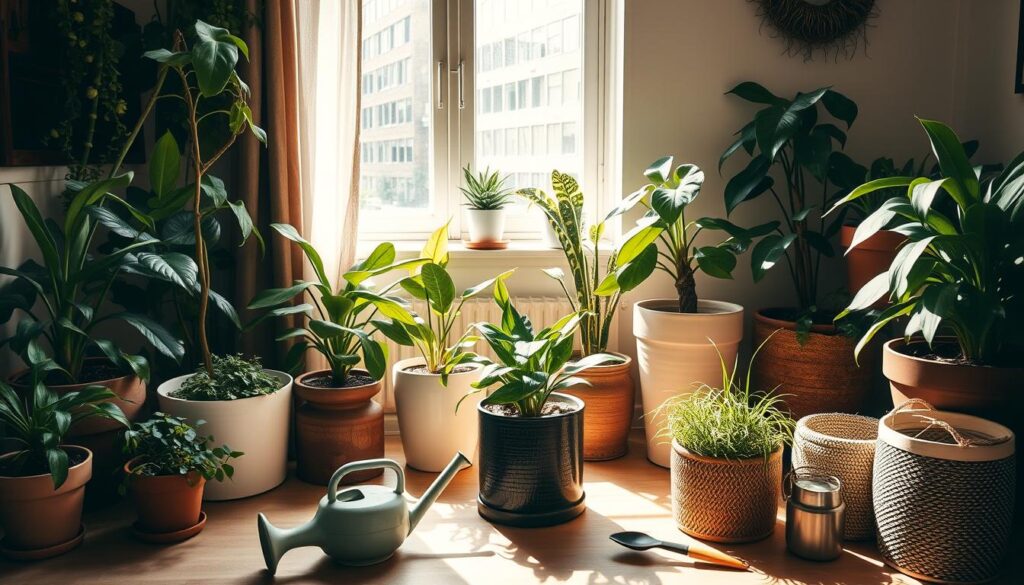
Creating an Indoor Garden Safety Plan
As a senior gardener, your main goal is to keep your indoor garden safe and fun. Making a good safety plan is key. It helps you enjoy pet-safe houseplants without risks. Here are some important steps to follow:
- Choose Pet-Safe Plants: Pick houseplants that are safe for your pets. Stay away from dangerous plants like lilies, azaleas, or sago palms.
- Utilize Stable Plant Stands: Make sure your plant stands or shelves are strong and won’t fall over. This prevents injuries.
- Organize Gardening Tools: Store your gardening tools neatly and within reach. This avoids tripping or getting cut.
- Provide Proper Lighting: Good lighting in your plant area helps prevent falls or accidents while you care for your garden.
- Choose Lightweight, Unbreakable Pots: Choose pots that are light and won’t break if dropped. This reduces the risk of cuts or bruises.
- Keep Emergency Contacts Handy: Have your vet’s number and the local poison control center’s number ready. This is for any plant-related emergencies.
By following these safety tips, you can enjoy indoor gardening safely. This way, you and your pets can have a happy and safe space. Remember, a little planning makes a big difference in creating a safe and beautiful indoor garden.
“Gardening is a great way for seniors to stay active, improve mental health, and connect with nature. By prioritizing safety, you can fully embrace the joys of indoor gardening without worry.”
Conclusion
Pet-safe houseplants bring many benefits to seniors, like better air and mental health. By picking easy plants and following care tips, you can make a lovely indoor garden. This garden can make your home better and your life happier.
Indoor gardening is good for your health and the planet. It’s a fun way to connect with nature and keep your pets safe. As you learn more about safe plants, enjoy growing your own green space.
With some knowledge and care, you can have a beautiful, safe garden. It will give you joy and health benefits for years. Enjoy the perks of pet-safe houseplants for seniors, indoor gardening benefits, and senior-friendly plants.
FAQ
What are some pet-safe houseplants recommended for seniors?
How do indoor plants benefit seniors?
What are some low-maintenance plants ideal for seniors?
What are the benefits of Spider Plants for seniors?
How can seniors maintain indoor plants with limited mobility?
What are some seasonal care tips for indoor plants?
How can seniors create a safe indoor gardening environment?
Source Links
- 22 Pet-Friendly Plants That Will Liven Up Your Space – https://www.architecturaldigest.com/story/pet-friendly-houseplants
- No title found – https://www.akc.org/expert-advice/home-living/nontoxic-houseplants-for-dogs/
- Safer Plants for Animals | Brookdale Senior Living – https://www.brookdale.com/en/brookdale-life/blogs/2024/08/plants-safe-animals-al.html
- Connecting Your Senior Loved One With Nature – https://www.mbkseniorliving.com/mbk-blog/connecting-your-senior-loved-one-with-nature
- Going Green: 5 Easy to Grow Plants for Seniors – myLifeSite – https://mylifesite.net/blog/post/going-green-5-easy-to-grow-plants-for-seniors/
- How to Make Your Home Pet Friendly – https://www.thisoldhouse.com/pets/21015549/how-to-make-your-home-pet-friendly
- Top 6 Easy Houseplants for Seniors to Enjoy – https://www.backyardboss.net/houseplants-perfect-for-seniors/
- These 7 Low-Maintenance Houseplants Are Perfect for Frequent Travelers – https://www.bhg.com/houseplants-for-travelers-8683581
- The Best Pet-Safe Indoor Houseplants for Cats and Dogs | Insurify – https://insurify.com/pet-insurance/knowledge/pet-safe-house-plants/
- By Sarah Heidtke, Master Gardener | DCMGV – https://www.dakotamastergardeners.org/indoorplants/pet-safe-plant-choices
- Pet-Friendly Indoor Plants — Sunnyside Nursery – https://www.sunnysidenursery.net/sunnyside-blogs/2024/11/18/pet-friendly-indoor-plants
- Spider Plant Care Guide – Care, Propagation, Lighting, Humidity, Temperature & More! | The Houseplant Shop – https://thehouseplant.shop/spider-plant-care-guide?srsltid=AfmBOorKsS99EovGFBXN2Jq-JFxE2BmzMBgpQ6Lc76Hbp65_ECTqEH9C
- 6 Pet-Safe Indoor Plants and Dr. Nicole’s Top Tips for a Pet-Safe Indoor Garden – https://www.lailaandme.com.au/blogs/news/6-pet-safe-indoor-plants-and-dr-nicoles-top-tips-for-a-pet-safe-indoor-garden?srsltid=AfmBOopY6VuVXq086OpwNyPGYYFz_19dv3PujsIuT0pCja5hnDwf9Axa
- Pet Friendly House Indoor Plants For Cats & Dogs | Lively Root – https://www.livelyroot.com/collections/pet-friendly-plants?srsltid=AfmBOoqJAl7gWh6qa1bN9Z2qDLvy068UiAuobqeTFKobUrOgz9SmSB9J
- 6 Pet-Safe Indoor Plants and Dr. Nicole’s Top Tips for a Pet-Safe Indoor Garden – https://www.lailaandme.com.au/blogs/news/6-pet-safe-indoor-plants-and-dr-nicoles-top-tips-for-a-pet-safe-indoor-garden?srsltid=AfmBOopBfiZU3TznI_54axp18JzADZ3BwywQvrW9IOmPBmJROkVJwo1M
- Are African Violets Poisonous to Cats? Vet-Reviewed Houseplant Safety Guide – Catster – https://www.catster.com/cat-health-care/are-african-violets-poisonous-to-cats/
- African Violet Houseplant Care Guide – https://36vine.com/blogs/plant-care-guides/african-violet/
- 22 Indoor Flowering Plants That Will Make Your Home Feel Happier – https://www.bhg.com/gardening/houseplants/projects/blooming-houseplants/
- Pet Friendly House Indoor Plants For Cats & Dogs | Lively Root – https://www.livelyroot.com/collections/pet-friendly-plants?srsltid=AfmBOoqBE6MLysDabTLDSpJ0xpVYE-FEycAliruP-y7_IC-I1Jqh74Gi
- The Best Houseplants for Low-Light Rooms and Air Purification – https://www.cnet.com/home/kitchen-and-household/these-houseplants-thrive-in-the-dark-and-purify-your-air/
- Pet-Friendly House Plants – https://www.statefarm.com/simple-insights/family/pet-safe-house-plants
- Pet-Friendly Houseplants | Gardener’s Supply – https://www.gardeners.com/how-to/pet-friendly-houseplants/9690.html?srsltid=AfmBOoogwy8FdseOgEvOLLh0XNFziSlaxA_Sh1uzqrRBXaxeu3Kk1-sz
- Easy-Care Best Houseplants for Seniors to Grow at Home – https://seniorindoorfun.com/best-houseplants-for-seniors/
- Pet-Safe Houseplants — 15 Varieties That Aren’t Toxic to Cats and Dogs – https://www.livingetc.com/advice/pet-friendly-houseplants
- Avoid the most common mistakes in plant care, we’ll tell you how – https://be.green/en/blog/avoid-the-most-common-mistakes-plant-care-tell-you-how?srsltid=AfmBOoqxhXJmsSgrdsKKNzqYjgNLpxqsjcKuLRRoPgxfs84U5N-Pr4aV
- Houseplants | Home and Garden Education Center – https://homegarden.cahnr.uconn.edu/tag/houseplants/
- The Benefits of Life having houseplants for the Elderly – Manor Retirement – https://www.manor-retirement.co.za/the-benefits-of-life-having-houseplants-for-the-elderly/
- How Caring for Plants Benefits Seniors Aging in Place – https://lareshomecare.com/how-caring-for-plants-benefits-seniors-aging-in-place/
- The Top 7 Health Benefits Of Houseplants — Seattle’s Favorite Garden Store Since 1924 – Swansons Nursery – https://www.swansonsnursery.com/blog/health-benefits-of-houseplants
- 9 Must-Know Tips for Keeping Your Houseplants Happy All Winter Long – https://www.bhg.com/gardening/houseplants/care/winter-houseplants-care-tips/
- 6 Plants You Should Always Bring Indoors for the Winter—Including Ferns – https://www.realsimple.com/plants-to-bring-indoors-for-winter-8738473
- 10 Easy House Plants That Thrive in the Winter – https://www.eatingwell.com/article/7884445/easy-house-plants-winter/
- 26 Pet-Friendly Houseplants Safe for Cats and Dogs – https://www.thespruce.com/safe-houseplants-for-pets-4588752
- Cat-Friendly Plants ‘Top 34 Nontoxic & Easy-Care’ Varieties! – https://planetdesert.com/blogs/news/cat-friendly-plants-top-34-easy-to-care-for-nontoxic-varieties?srsltid=AfmBOoo97H6474saLshLWb5N6UfuLZ0_2b3e_NoFkLN073si1th6_eLm
- The Ultimate Guide to a Dog Friendly Backyard – https://www.birdsandblooms.com/gardening/gardening-basics/ultimate-guide-dog-friendly-backyard/?srsltid=AfmBOop3fFFJiD6tECv10SSuyDjHN2sJmQn3HDmFTC3PiCs1y872_VjT
- Real vs Faux Plants – https://www.root-houseplants.com/blog/plant-knowledge/real-vs-faux-which-should-i-get/
- 8 Beautiful Pet-Safe Houseplants – https://www.thisoldhouse.com/pets/22678056/pet-friendly-houseplants
- Is Golden Pothos Poisonous? Understanding Risks for Cats, Dogs, and Humans – https://www.livelyroot.com/blogs/plant-care/golden-pothos-toxicity?srsltid=AfmBOoo6A9v1MrbinUekY5NQ0EgVH3LMxgXos7cJjFaWXkCoQXLqkeTS

